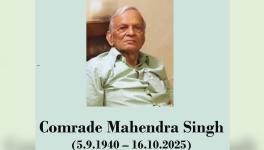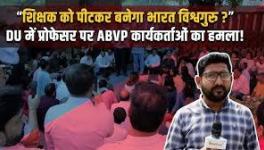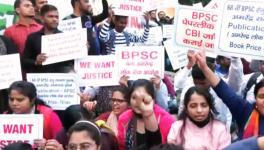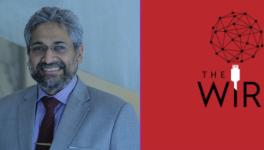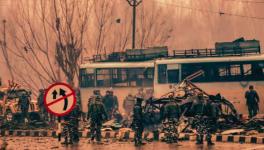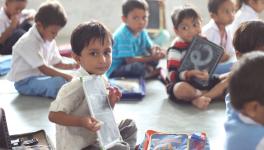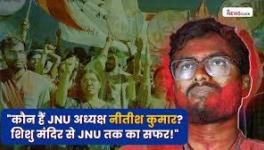Has the Cycle of Campus Unrest Returned ?
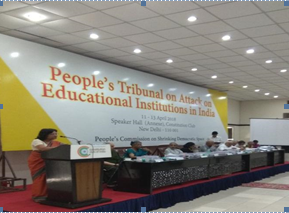
"Speak for your lips are still free” Faiz Ahmed Faiz.When the press was in chains in Pakistan, later in India too, this quote of the world-renowned poet, was often remembered. It was visible at the meeting too. For two full days, at the Constitution Club in Delhi, speakers charged that democratic space was in danger and a tribunal there brought this out in front of the jury. In a tribunal on ‘Shrinking Democratic Space’, a number of teachers and students presented their testimonies in front of a jury consisting of eminent educationists and jurists.
Some of the testimonies were really revealing. The jury panel of the tribunal comprised Justice (Retd.) Hosbet Suresh, Justice (Retd.) B.G. Kolse Patil, Prof. Amit Bhaduri, Dr Uma Chakravarty, Prof. T.K. Oommen, Prof. Vasanthi Devi, Prof. Ghanshyam Shah, Prof. Meher Engineer, Prof. Kalpana Kannabiran and Ms Pamela Philipose. Prof. Romila Thapar was the Chair of the plenary session of the tribunal.Testimonies of 120 students and teachers from close to 50 institutions and universities spread across 17 states were considered by the jury panel; 49 testimonies were deposed orally at the tribunal. Along with these testimonies, there were 17 expert submissions on all thematic issues.
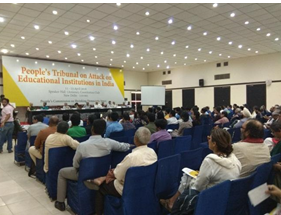
Voices
For example, a professor from a Gujarat University pointed out that in the recent years, a number of private universities have mushroomed in the state, that function out of small primary schools, have a Tehsildar's office, but have no VC or professors. They charge a whopping fee under the very nose of the state government. After all, the government was withdrawing from the field of education!
Very recently- the Delhi University Teachers Association (DUTA), was on a five-day strike and had been agitating continuously against the educational policy of the government. The seventh pay commission stipulated the 70-30 formula i.e. the educational institution would have to raise 30% of total finance implying that the fees charged have to be increased at the peril of the majority of the student. The government tried to give the bait of the autonomy to a number of universities like Jawarhalal Nehru University and the University of Hyderabad and the other 66 universities, shaking of the financial responsibilities. These all are very ominous signs. Hence the teachers and students have been forced to come out in the streets to agitate. In the capital city, the students were spared lathi charge by the police, but in many states, the police resorted to lathi charge to bring the students under control. Under pressure, central universities got a reprieve.
The JNU incident of February 9, 2016, was seen as a glaring example of how the state is trying to suppress the students' protests by branding them as anti-social. It has even tried to put the charges of sedition on the student leaders like Kanhaiya Kumar, Umar Khalid, Anirban Bhattacharya and others after the subsequent turmoil created by lawyers who beat them inside the court when they were produced before the judge.
Advocate Brinda Grover jokingly said that fighting for teachers and students in the courts seems to have become her new specialisation. She pointed out that criminal laws are now being used against students and even teachers to “demonise the individual and vilify the institution”. She added that she fought for Prof. Mukul Manglik’s case in Ramjas incident of Feb 21, 2017, when in a peaceful seminar at the college premises, the professor was attacked by ABVP because they did not like the subject on which he was talking. A reputed and highly respected Prof. Mukul was manhandled by the students and branded anti-national. The vilification campaign went so far that even a part of the media joined the vilification campaign forcing Mukul to go underground for some time. ABVP was obviously backed by the ruling regime in their campaign.
One of the office bearers of Punjab University agitating against the increase in fees narrated how the police first asked him his religion, when he did not reply they snatched his ID card and after finding him to be a 'Singh', they asked him his caste. When they came to know that he is a Dalit, they started beating him mercilessly and ridiculed him for daring to come to Chandigarh to pursue his studies. "Umar of JNU also has similar experience under custody, as police in the new regime have a preconceived idea that Muslims are terrorists. Actually, such a mindset is visible in the society when innocent people get killed only for being Muslim," he said.
Another student, Pankhi, who is pursuing her PhD from Department of Social Science in IIT Bombay, and is an active member of the Ambedkar Periyar Phule Study Circle (APPSC) said that discrimination inside the campus was practised in a very subtle and covert way. There were less than 10 SC/ST teaching faculty in entire IIT Bombay campus. When APPSC enquired about less representation, of SC/ST faculty in teaching, the administration maintained that the normal reservation policy did not operate in IIT which was governed by its own statute. In 2014, there was a case in the IIT Bombay campus, that of the suicide of Aniket Ambhore. At that time, the head of the department had openly made a comment that IIT was a chocolate not everybody could have, to indicate that students coming from reserved category could not cope with other general students. Before his suicide, Aniket had expressed his desire to withdraw his admission from IIT and give the IIT JEE again and come back in the general category.
Privatisation of Education
We have observed through depositions made by students, teachers and experts that there is a systematic onslaught on the very idea of higher education in India. The recent decision by the Ministry of Human Resource and Development to grant autonomy to public institutions is an example of how the state is seeking to ensure that students from poor and backward communities are being driven to the periphery and denied access to equal, quality and affordable education. In the name of autonomy, vocational and market-friendly courses are now being promoted.
Consequently, across the country, institutions that once had a good representation of SC, ST and OBC students are now in danger of losing their presence, precisely because these institutions have introduced fee structures that are completely unaffordable. We found that students are in a state of desperation. The diversity of representation of students in some of these prestigious institutions is in danger of being undermined by unaffordable fee structures introduced during the recent past.
Saffronisation of Education
It was noted that along with this privatisation, there has been a rise of socio-cultural conservatism. Local cultural resources have been appropriated by the Hindutva forces in order to buttress their own presence in local educational institutions. For instance in Assam, there are 500 RSS controlled schools under the name of Shankar Debo Shishu Niketan, 1.6 lakh students are accessing these institutions. The secular philosophy of Shankar Debo has been taken over to project the Hindutva ideology. What we are witnessing here is an increasingly homogenous and conformist academic culture.
While essays such as Ramanujan’s 300 Ramayanas have been knocked out of the syllabus, the Sanskrit department of the Delhi University is said to be undertaking a “thorough” study of history to prove that Aryans were indigenous to India. We were told that RSS’s eight-point guide to education is now providing the programmatic framework for these shifts. This is impacting both students and staff. An example can be cited from one of the prominent universities of Uttar Pradesh, where teachers who had no academic qualification have been appointed to positions of authority on the basis of their affiliations with Hindutva outfits. What has been extensively documented is that any dissent or opposition to such efforts to distort history has led to severe crackdowns on students and teachers, a trend that has been accentuated since this government came to power. There has been systematic restrictions on student elections and all efforts to form student unions in many states.
Criminalisation of Dissent
From the testimonies given, it became clear that suppression of dissent has taken various forms like legal action, disciplinary action, coercion within the universities against students and teachers on the basis of their dissent. This has often taken the form of denial and diversion of entitled funds to targeted students, teachers and departments. This is being done with the deliberate intention by the authorities to create an atmosphere of fear and terror within the academic community. In many cases, the unprecedented presence of police and intelligence are particularly targeting vulnerable students especially Muslims, Dalits, women and people from marginalised communities.
By placing like-minded people in high posts in the administration, the authorities are being enabled to execute the commands of the government, to attack dissenting students and professors.
The academic community has been subjected to not only physical brutalities and humiliating discriminatory comments but also to extensive surveillance, inside and outside the campus. The criminal justice system is being used against students and teachers, the fundamental rights and freedoms guaranteed by the Constitution are being systematically violated and any kind of non-conformity is being criminalised under the guise of one version of nationalism. Labels like 'anti-nationals', 'terrorists', 'deshdrohi' and 'enemies of the state' are freely used to intimidate students and teachers.
Dalit and tribal students are denied sufficient access to institutions of higher education, including hostels. They are subjected to humiliation based on their identities in the campuses. There is double discrimination in the case of Dalits in the form of decrease of the quantum of funds along with everyday discrimination faced by them due to their caste identity. When it comes to Dalit female students, the intersection of caste and gender is an additional discrimination and aggravates the situation.
Sexual harassment exists systematically in institutional spaces through discriminatory patriarchal practices and intimidation tactics to reduce them from participating in political activities. Institutions have gender insensitive practices, including the failure to understand the discrimination of queer and transgender.
However, there is a spirit of ‘Rejection of victimhood’ among the Dalit students. Although they are intimidated, they have not given up and are fighting back. During the protests demanding extended hostel timings for girl students in a prominent Uttar Pradesh university, the Vice-Chancellor had reportedly said that “It is unnatural for girl students to study at night”.
Kashmiri students and teachers are doubly stigmatised for being Muslim and Kashmiri. They are also often dubbed as ‘anti-nationals’, ‘Islamist terrorists’, ‘Pakistani agents’, etc. Systematic racist targeting of students from North-eastern states in public spaces are increasing and they also feel estranged due to their identity as tribals. The attacks and discrimination are primarily racist but have undercurrents of their religious and tribal identities.
The content of knowledge is unfortunately from upper caste teachers in most of the colleges who are attached to majoritarian ideologies and hence classrooms become laboratories where the minds of young students are being moulded in a certain way. There is no diversity in the learning system. These trends, unless addressed, pose a profound danger to the very fabric of Indian democracy.
Since 2014, the University Grants Commission introduced some drastic changes in policy. Last year, the UGC substantially reduced the number of PhD and M. Phil seats. To give an example, in JNU, the seat cut was an effective 84 percent, down to 194 from 1,000. Such massive seat cuts in research were opposed by many universities, including JNU where the intake for the year in several centres was zero. It also reduced the number of PhD and M.Phil. students a professor could supervise. The total number of admissions in JNU last year, dropped by an approximate 14,000 as compared to previous years. The UGC notification also did away with JNU's unique deprivation point system that awarded 12 extra marks to students coming from rural areas, especially female students. This would effectively hurt the diverse and inclusive character of JNU where students from all over the country could come to study.
The VC of JNU, Jagadesh Kumar was accused of tampering with faculty selection committees and rules for partisan appointments of deans and chairs. According to JNUSU, Prof Pradipta Chowdhury was appointed as the Dean of School of Social Sciences by the VC superseding seniority of several professors.
When students marched to the Parliament against sexual harassment and other issues, they were met with a violent police force, and lathi-charged. 35 students were injured and 23 were detained, against whom police FIRs were filed. Female protestors alleged they were molested and a video of a girl's clothes being torn went viral on social media. Women journalists were also manhandled. Two complaints were filed, both by journalists, for molestation and assault and two constables were suspended snatching the camera of a photojournalist.
Indeed, as it has been observed, students movements continue to play an important role in the Indian democracy, questioning and critiquing anti-people government policies and state action. It constitutes a formidable and necessary voice of dissent and opposition, outside the realm of parliamentary democracy. So it comes as no surprise that they are subject to interference, repression and state action from the ruling governments. From the sixties, till now, one has been an eyewitness, to periods of lull and periods of the storm. This cycle continues.
(The writer covered the education ministry and campuses for over 30 years.)
Disclaimer: The views expressed here are the author's personal views, and do not necessarily represent the views of Newsclick.
Get the latest reports & analysis with people's perspective on Protests, movements & deep analytical videos, discussions of the current affairs in your Telegram app. Subscribe to NewsClick's Telegram channel & get Real-Time updates on stories, as they get published on our website.










